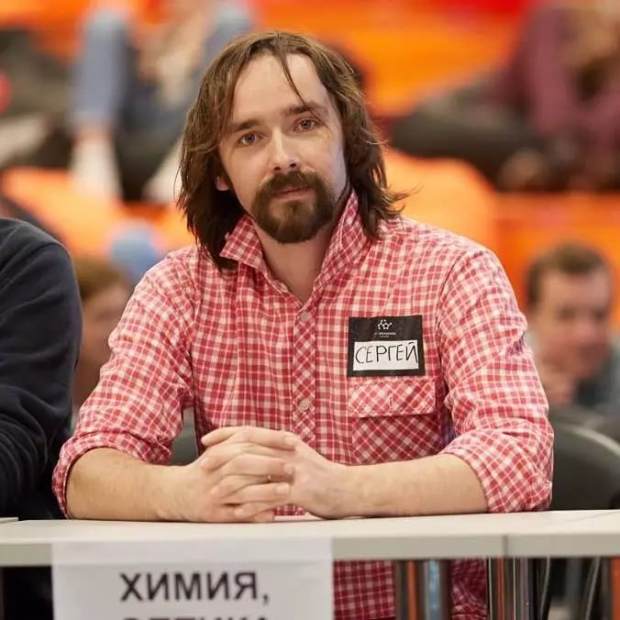Scientist Siarhei Besarab talks about the patronage of political prisoner Artem Bayarski as part of the information campaign of our Foundation and the Dissidentby initiative "Until All are free."
"When I was fired for political reasons in 2020, it was very painful that none of the colleagues I had worked with, who were essentially considered my second family, said a word in my defense. People avoided eye contact, tried not to meet on the street, at best whispered: 'why did you decide to ruin your career for some incomprehensible crane in the sky?'. But words of support were spoken by people, other Belarusian scientists whom I had never known, stood shoulder to shoulder. To say that it touched me – would be an understatement.
I keenly felt that all this time, until 2020, I invested my attention not in the right things. Not in the real ones, but in something incomprehensible, empty, imposed on me by someone. I drew conclusions from this situation. The first and foremost of them is that if you want scientific solidarity, start by being its example. My support for Artem Bayarski, an Olympian, a chemist-pharmacist, my compatriot from the Grodno region, is precisely that first, personal step. My small contribution to that future, to that scientific community that I would like to see in the New Belarus.
Now many talk about society being tired of political news. Those who are in exile will try to build a new life, somehow fit into the societies of the countries that have accepted them. Fewer and fewer people are interested in news from Belarus. I understand that. And for me, as for many, the only thing that connects with that August Belarus of 2020 is our political prisoners. They are now on the verge of our memory, they are the quintessence, the accumulator of that almost magical energy, the explosion of which brought thousands of people to the streets in 2020.
Additionally, as a scientist, I would like to provide some scientific justification. The transition of our civilization to a digital state is obvious to many. In the digital world, familiar phenomena are not represented as in the real world. This also applies to collective memory. The digital world changes people. In my publications, I often refer to Japanese research that studies the genesis of collective memory, that is, how certain news is perceived and lives in society. And the conclusions there are not very encouraging – even the most negative news, memory of them, does not last long. Life of news in people's consciousness depends on how often they see the news. The maximum attention level exists only for a day. Then attention decreases almost to zero over the week, and only those who have a long-term interest in it remember the news or the person. Approximately within a month, the memory of the event or the person completely dissolves in collective memory, displaced by other news. This is how society reacts to the colossal flow of information.
In other words, maintaining attention levels is simply impossible, you need to constantly update, raise news about a person or an event if you don't want it to disappear in the information whirlpool. I, of course, cannot cover all the thousands and dozens of political prisoners in Belarus, but almost intuitively, as my heart asks, I write about those who are now in the hell of Belarusian prisons. About my friends and people whom I knew and respected. Not just about Artem. About Mikola Dziadok, who was my reader and subscriber. About Stsiapan Latypau, whose fate unexpectedly intertwined with ours. About the rational and delicate Aksana Zaretskaya, who taught me the history of etiquette. About the optical physicist Yagor Liebiadok or the electronics physicist Yura Adamau, with whom I often, as an analyst with analysts, discussed certain events or forecasts. Belarus for me is now all these people.
Unfortunately, in today's conditions, when you yourself are in exile and all your social networks are banned by the criminal authorities, it is difficult to do much of what you would like to do. Care in such, almost military conditions, and in Belarus now there is a war, a war against Belarusians, can only be within the information space. And even that, with many restrictions, because you have to keep in mind all the time, the main thing – not to harm the person who is behind bars. Unfortunately, we have to accept the rules of the game that the inhuman and illegitimate authorities impose on all of us. Now it is only possible to filter out small, drop by drop, scraps of information from behind bars and deliver them to the public.
I understood that Belarusians need to inform the world community about these heinous crimes against humanity that are taking place before our eyes. To shout about it to the whole world. Therefore, every post of mine I definitely translate into English. Political prisoners have no nationality, just like criminals, murderers, and torturers. And I plan to continue my activities until everyone is free. And to do this as widely as possible."
Artem Bayarski is a student at the Faculty of Chemistry of BSU. He was arrested twice – in November 2020 and February 2021. The second time he was not released. On December 9, 2021, he was found guilty under two articles of the Criminal Code and sentenced to five years of imprisonment in a maximum security regime.
Siarhei Besarab is a Belarusian scientist in the field of surface science, a science blogger. Creator of the Telegram channel dedicated to radiation, chemical, and biological safety, civil defense.
"When I was fired for political reasons in 2020, it was very painful that none of the colleagues I had worked with, who were essentially considered my second family, said a word in my defense. People avoided eye contact, tried not to meet on the street, at best whispered: 'why did you decide to ruin your career for some incomprehensible crane in the sky?'. But words of support were spoken by people, other Belarusian scientists whom I had never known, stood shoulder to shoulder. To say that it touched me – would be an understatement.
I keenly felt that all this time, until 2020, I invested my attention not in the right things. Not in the real ones, but in something incomprehensible, empty, imposed on me by someone. I drew conclusions from this situation. The first and foremost of them is that if you want scientific solidarity, start by being its example. My support for Artem Bayarski, an Olympian, a chemist-pharmacist, my compatriot from the Grodno region, is precisely that first, personal step. My small contribution to that future, to that scientific community that I would like to see in the New Belarus.
Now many talk about society being tired of political news. Those who are in exile will try to build a new life, somehow fit into the societies of the countries that have accepted them. Fewer and fewer people are interested in news from Belarus. I understand that. And for me, as for many, the only thing that connects with that August Belarus of 2020 is our political prisoners. They are now on the verge of our memory, they are the quintessence, the accumulator of that almost magical energy, the explosion of which brought thousands of people to the streets in 2020.
Additionally, as a scientist, I would like to provide some scientific justification. The transition of our civilization to a digital state is obvious to many. In the digital world, familiar phenomena are not represented as in the real world. This also applies to collective memory. The digital world changes people. In my publications, I often refer to Japanese research that studies the genesis of collective memory, that is, how certain news is perceived and lives in society. And the conclusions there are not very encouraging – even the most negative news, memory of them, does not last long. Life of news in people's consciousness depends on how often they see the news. The maximum attention level exists only for a day. Then attention decreases almost to zero over the week, and only those who have a long-term interest in it remember the news or the person. Approximately within a month, the memory of the event or the person completely dissolves in collective memory, displaced by other news. This is how society reacts to the colossal flow of information.
In other words, maintaining attention levels is simply impossible, you need to constantly update, raise news about a person or an event if you don't want it to disappear in the information whirlpool. I, of course, cannot cover all the thousands and dozens of political prisoners in Belarus, but almost intuitively, as my heart asks, I write about those who are now in the hell of Belarusian prisons. About my friends and people whom I knew and respected. Not just about Artem. About Mikola Dziadok, who was my reader and subscriber. About Stsiapan Latypau, whose fate unexpectedly intertwined with ours. About the rational and delicate Aksana Zaretskaya, who taught me the history of etiquette. About the optical physicist Yagor Liebiadok or the electronics physicist Yura Adamau, with whom I often, as an analyst with analysts, discussed certain events or forecasts. Belarus for me is now all these people.
Unfortunately, in today's conditions, when you yourself are in exile and all your social networks are banned by the criminal authorities, it is difficult to do much of what you would like to do. Care in such, almost military conditions, and in Belarus now there is a war, a war against Belarusians, can only be within the information space. And even that, with many restrictions, because you have to keep in mind all the time, the main thing – not to harm the person who is behind bars. Unfortunately, we have to accept the rules of the game that the inhuman and illegitimate authorities impose on all of us. Now it is only possible to filter out small, drop by drop, scraps of information from behind bars and deliver them to the public.
I understood that Belarusians need to inform the world community about these heinous crimes against humanity that are taking place before our eyes. To shout about it to the whole world. Therefore, every post of mine I definitely translate into English. Political prisoners have no nationality, just like criminals, murderers, and torturers. And I plan to continue my activities until everyone is free. And to do this as widely as possible."
Artem Bayarski is a student at the Faculty of Chemistry of BSU. He was arrested twice – in November 2020 and February 2021. The second time he was not released. On December 9, 2021, he was found guilty under two articles of the Criminal Code and sentenced to five years of imprisonment in a maximum security regime.
Siarhei Besarab is a Belarusian scientist in the field of surface science, a science blogger. Creator of the Telegram channel dedicated to radiation, chemical, and biological safety, civil defense.


 Continue
Continue
